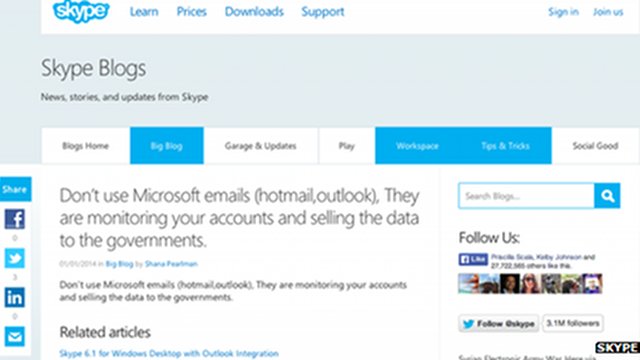SUMMARY
This is AI generated summarization, which may have errors. For context, always refer to the full article.

WASHINGTON DC, United States – The Syrian Electronic Army hacker group set its sights on Skype’s social media accounts Wednesday, January 1, to accuse Microsoft of spying on user data.
Microsoft-owned Skype’s Twitter account displayed the message: “Don’t use Microsoft emails(hotmail,outlook),They are monitoring your accounts and selling the data to the governments.More details soon #SEA.”
It was posted around 1030 GMT but was removed less than two hours later.
Microsoft could not immediately be reached for comment.
The SEA account belongs to the Syrian Electronic Army, which backs the Damascus government.
In a posting on its own Twitter account, the SEA said “You can thank Microsoft for monitoring your accounts/emails using this details,” and listed Microsoft CEO Steve Ballmer’s contact information.
The group has previously hacked accounts of The New York Times, Agence France-Presse and other media organizations.
The SEA’s latest attack appears to be linked to documents released by National Security Agency leaker Edward Snowden, which revealed the PRISM surveillance program.
PRISM is said to give the NSA and FBI easy access to the systems of nine of the world’s top Internet companies including Google, Facebook, Microsoft, Apple, Yahoo and Skype.
The program apparently allowed the NSA to spy on audio and video calls using so-called secret backdoors. Skype has denied the existence of such access.
Tech blogs said that at one point, the Skype blog had the headline: “Hacked by Syrian Electronic Army.. Stop Spying!”
Skype’s Twitter account was also said to have posted the message: “Stop spying on people! via Syrian Electronic Army.”
But links provided by the SEA’s Twitter account to Skype’s blog and Facebook account did not work, and no SEA message appeared on those sites around 0030 GMT, having apparently been removed. – Rappler.com
Add a comment
How does this make you feel?
There are no comments yet. Add your comment to start the conversation.